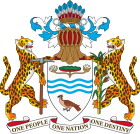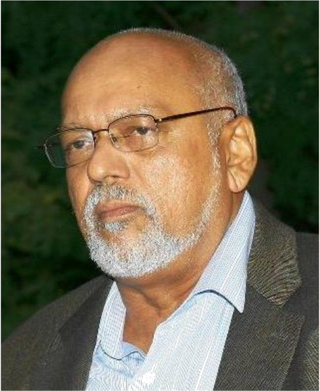 |
|---|
| Constitution |
The United Republican Party (URP) is a political party in Guyana.
 |
|---|
| Constitution |
The United Republican Party (URP) is a political party in Guyana.
The URP was established in the United States by Vishnu Bandhu in March 1985, before being launched in Guyana in November 1987; [1] it was formally registered on 26 April 1988. [1] In 1990 it suffered a split when some members left to form the National Republican Party. [2] The party contested the 1992 general elections, but received just 0.4% of the vote and failed to win a seat. [3]
The URP did not contest any further elections until 2015, when, still led by Bandhu, it received just 432 votes (0.11%), again failing to win a seat. [4]
Vote splitting is an electoral effect in which the distribution of votes among multiple similar candidates reduces the chance of winning for any of the similar candidates, and increases the chance of winning for a dissimilar candidate. This is commonly known as the spoiler effect, which can discourage minor party candidacies.

Linden Forbes Sampson Burnham was a Guyanese politician and the leader of the Co-operative Republic of Guyana from 1964 until his death in 1985. He served as Premier of British Guiana from 1964 to 1966, Prime Minister of Guyana from 1964 to 1980 and then as the first Executive President of Guyana from 1980 to 1985. He is often regarded as a strongman who embraced his own version of socialism.

Elections in Guyana take place within the framework of a multi-party representative democracy and a presidential system. The National Assembly is directly elected, with the nominee of the party or alliance that receives the most votes becoming President.

The People's Progressive Party/Civic (PPP/C) is a major political party in Guyana. As of 2020, the party holds 33 of the 65 seats in the National Assembly and forms the government. It has been the ruling party in the past as well, most recently between 1992 and 2015. In Guyana's ethnically divided political landscape, the PPP/C is a multi-ethnic organization that is supported primarily by Indo-Guyanese people.

Donald Rabindranauth Ramotar is a Guyanese politician who was President of Guyana from 2011 to 2015. He was also the General Secretary of the People's Progressive Party (PPP) from 1997 to 2013.

The National Front Alliance is a political party in Guyana.
United Force (UF) is a conservative and economically liberal political party in Guyana. It currently has no representation in the National Assembly and is led by Marissa Nadir.

David Arthur Granger is a Guyanese former politician and retired military officer who served as the ninth president of Guyana from 2015 to 2020. A member of the People’s National Congress (PNC), he previously served as Commander of the Guyana Defence Force and as National Security Adviser from 1990 to 1992. He was leader of the Opposition in the National Assembly of Guyana from 2012 to 2015.

The Justice for All Party (JFAP) is a political party in Guyana.

The National Democratic Front (NDF) is a political party in Guyana.

The People's Democratic Movement (PDM) was a centrist political party in Guyana.

The National Republican Party (NRP) was a right-wing political party in Guyana.
The Peace, Equality and Prosperity Party was a political party in British Guiana led by Kelvin De Freitas.

The Guiana United Muslim Party (GUMP) was a Muslim political party in Guyana.

The Justice Party was an Indo-Guyanese political party in British Guiana.

Early general elections were held in Guyana on 11 May 2015, alongside regional elections as a result of President Donald Ramotar proroguing the National Assembly. The result was a victory for the A Partnership for National Unity+Alliance for Change (APNU+AFC) alliance, which won 33 of the 65 seats in the National Assembly. Following the elections, APNU leader David A. Granger was sworn in as president on 16 May 2015.
Balram Singh Rai was a Guyanese politician. He served as Minister of Community Development and Education from 1959 to 1961, then the first Minister of Home Affairs from 1961 to 1962.

Snap general elections were held in Guyana on 2 March 2020. They were called early after the government of President David A. Granger lost a vote of no confidence by a margin of 33–32 on 21 December 2018, the government having held a one-seat majority since the 2015 elections. However, one of its own MPs, Charrandas Persaud of the Alliance for Change (AFC), voted with the opposition. Granger announced on 25 September 2019 that the elections would be held on 2 March 2020.

Aubrey Norton is a Guyanese politician serving as Leader of the Opposition and as a member of the National Assembly since April 2022.

The 2023 Guyanese local elections, officially due since 2020, were held on Monday, June 12, 2023, following the latest delay of the officially biennial polls by three years due to lawsuits and vacanies at the Guyana Elections Commission (GECOM) following the fallout and misconduct of the 2020 Guyanese general election and the COVID-19 pandemic. All 1,220 council seats within 610 constituencies across Guyana's 80 local authority areas (LAAs), comprising 70 neighbourhood democratic councils (NDCs) and 10 municipalities are being conteted. GECOM has stated that voting is not required in 291 constituencies in which the ruling People's Progressive Party/Civic (PPP/C) has won by acclamation due to no other candidates running against them. As a result the PPP/C has retained control and has won allseats in LAAs such as the NDCs of Leguan, La Jalousie/Nouvelle Flanders, Canals Polder, Little Diamond/Herstelling, Ordnance Fort Lands/ No. 38, Kintyre/No. 37 or Borlam, Kilcoy/Hampshire, Port Mourant/John, Bloomfield/Whim, No. 64/No. 74, the municipality of Lethem and has also gained control of the Aranaputa/ Upper Burro Burro NDC. The PPP/C is hoping to win over A Partnership for National Unity (APNU)/People's National Congress Reform (PNCR)opposition strongholds, campaigning heavily in Guyana's capital city, Georgetown, which has remained in APNU/PNCR control since independence from the United Kingdom in 1966. Efforts by the PNCR to postpone or cancel the elections via litigation regarding the electoral roll and local government constituency boundaries, were dismissed by Guyana's High Court in the lead-up to these elections, claiming that, these issues are behind its no-contest of 291 constituencies across the 80 LAAs. The opposition Alliance for Change (AFC), the junior coalition partner of the APNU, has boycotted the 2023 local elections over similar concerns.